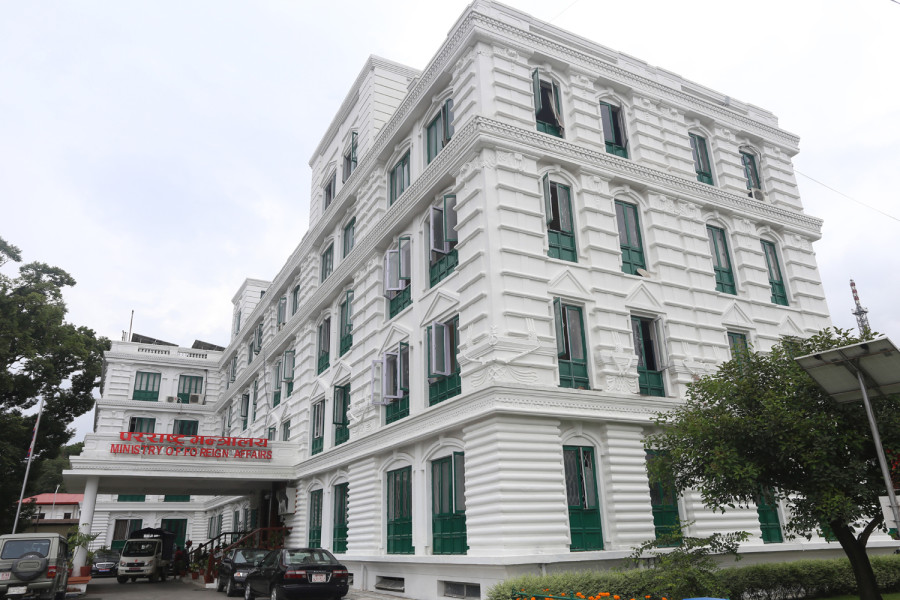National
Conflict among ministries stymies Foreign Ministry’s expansion plans
The ministry had planned to add more diplomatic staff and expand its missions abroad but the Finance Ministry says that would only add to the state’s financial burden.
Anil Giri
The Foreign Ministry had big plans to expand its missions abroad and hire more diplomatic staff, but discord among the Foreign Ministry, Finance Ministry and Ministry of General Administration has meant that those plans might not materialise anytime soon.
Two years ago, Finance Minister Yubaraj Khatiwada had announced plans to cut down on the number of Nepali embassies to lessen the financial burden on the state. The Foreign Ministry had proposed an alternate plan—cut down on some missions but hire more staff and open up a few new offices.
According to two officials from the Foreign Ministry, there were plans to hire 20 to 30 more diplomatic staff, including five joint-secretaries to be deputed to the President’s Office, the Nepali mission in Geneva, the Institute of Foreign Affairs, a separate office to look after the media and archives, and one post that would be reinstated after being revoked a few years ago. There are currently 12 joint-secretaries at the Foreign Ministry.
The Ministry of General Administration had agreed to increase the number of diplomatic staff by 10 percent, including the five joint-secretary posts. But ultimately, the Finance Ministry did not agree.
A task force was then formed, led by former ambassador Rudra Nepal, to suggest how many missions Nepal needs and which missions are to be trimmed down. The task force, however, failed to reach a conclusion after Nepal moved to the United States, according to a task force member. As per the Finance Ministry’s assessment, Nepal’s missions in Spain, Brazil, South Africa, Canada, Austria and Denmark could either be closed down or their scope of work shared with nearby embassies. Apart from Brazil, none of these host nations has opened its mission in Kathmandu.
And the Foreign Ministry wanted to set up missions in some countries like Singapore, Portugal, even within South Asian countries like Bhutan, the Maldives and Afghanistan and some East Asian countries like Indonesia.
Nepal has six consulate general offices and 33 embassies, including three permanent missions to the United Nations—in New York, Geneva and Vienna. The budget of the Foreign Ministry is currently around Rs2 billion—or 0.51 percent of the total national budget—with most of the funds allocated to renting offices, chanceries and residences for Nepali missions abroad. Nepal spends around Rs800 million on the operation of its embassies around the world.
“We have just completed the organisation and management survey of our ministry. A new bureaucratic structure is in the offing since the country was federated and the civil service adjustment is taking a long time,” said a joint-secretary at the Foreign Ministry. “But sooner or later, an appropriate decision will be taken on restructuring the Foreign Ministry as well as whether or not we will be opening more missions.”
Foreign Minister Pradeep Gyawali is not too pleased with the delay in implementing his plans. Under Gyawali, the ministry is believed to have expanded its outreach and pursued a policy of “being seen and heard” across the world.
“I don’t know why some of our bureaucrat friends nurture unnecessary egos,” Gyawali told the Post. “I don’t understand the prejudice against our diplomatic staff. There is no substantive logic behind the scuttling of our plans. This is all about ego.”
The Foreign Ministry is also battling the Ministry of General Administration over another issue—an amendment to the Civil Service Act that would allow all government secretaries to become the Foreign Secretary. Currently, only bureaucrats from the Foreign Service can rise to the post of Foreign Secretary.
Foreign Ministry officials had lobbied outgoing general administration minister Lalbabu Pandit to remove this provision.
“We were not proposing the scrapping of the Foreign Service,” Pandit told the Post. “Any aspirant can join the Foreign Service but we have opened the gate for all secretaries to become foreign secretary.
Pandit, who was replaced by Hridayesh Tripathi in Prime Minister KP Sharma Oli’s Cabinet reshuffle in November, said that his proposal was not just aimed at the Foreign Ministry but applied across the civil service.
But Foreign Ministry officials argue that the Foreign Service is an elite part of the civil service all over the world. The government’s plans could destroy the Foreign Service, which will ultimately undermine the country’s image and its foreign policy conduct, they said.
Some ministry officials even blamed Gyawali for not taking a firm stand with Oli regarding the “encroachment” on the Foreign Service.
Gyawali, however, said that he had attempted time and again to douse suspicions that the Foreign Ministry’s plans were in favour of particular people or a particular interest group.
“There have been several interest groups in our bureaucracy for some time now, and some ministries tend to believe that they have both the lock and the key in their hands,” he said. “That is a major problem with our bureaucracy.”




 10.12°C Kathmandu
10.12°C Kathmandu














